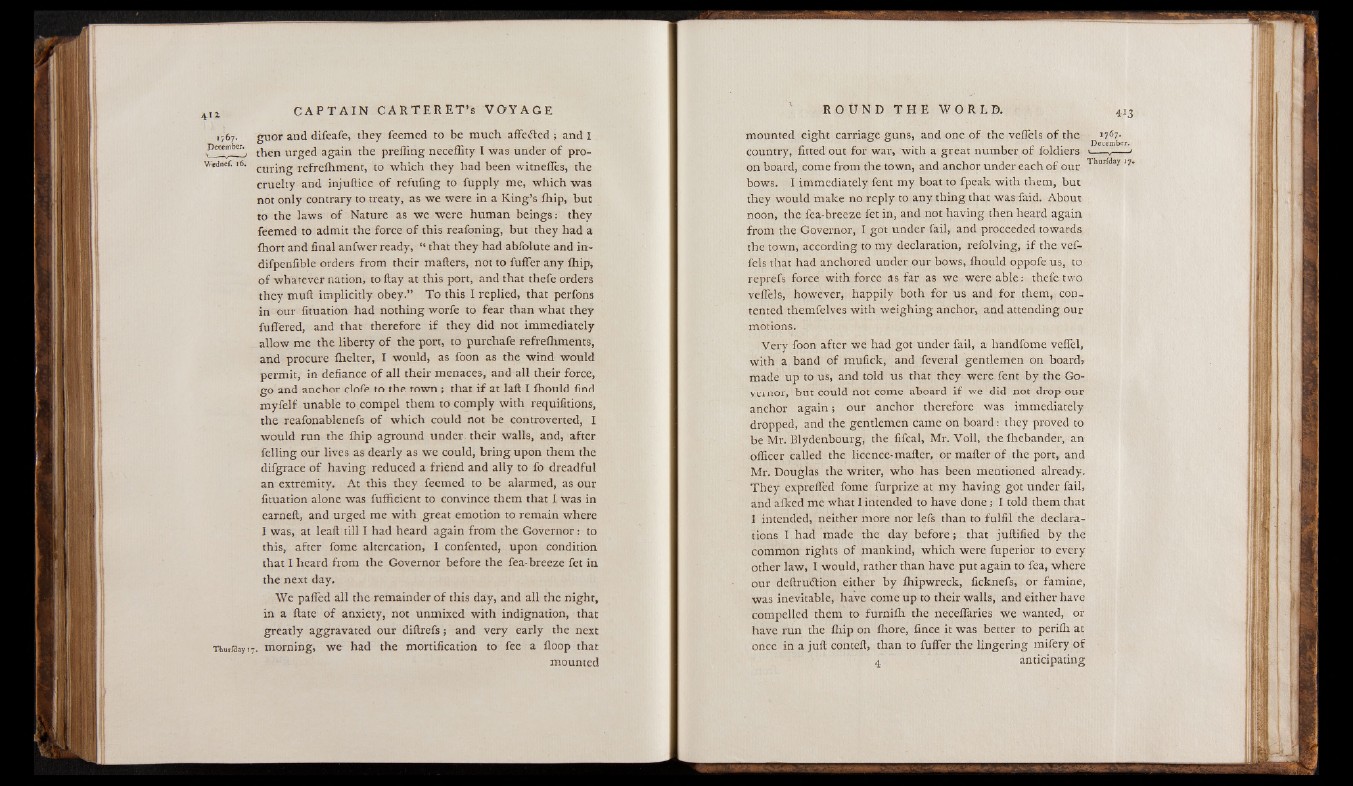
1567. guor and difeafe, they feemed to be much attested ; and I
December,^ urged again the prefling neceflity I was under o f pro-
w»dnef. 16. curjng refrefhment, to which they had been witnefles, the
cruelty and injuftice of refufing to fupply me, which was
not only contrary to treaty, as we were in a King’s fhip, but
to the laws of Nature as we were human beings: they
feemed to admit the force of this reafoning, but they had a
fhort and final anfwer ready, “ that they had abfolute and in-
difpenfible orders from their matters, not to flutter any fhip,
o f whatever nation, to flay at this port, and that thefe orders
they mutt implicitly obey.” To this I replied, that perfons
in our fituation had nothing worfe to fear than what they
fluttered, and that therefore i f they did not immediately
allow me the liberty of the port, to purchafe refrelhments,
and procure lhelter, I would, as floon as the wind would
permit, in defiance o f all their menaces, and all their force,
go and anchor clofe to the town ; that i f at laft I fhould find
myfelf unable to,compel them to comply with requifitions,
the reafonablenefs of which could not be controverted, I
would run the flhip aground under their walls, and, after
felling our lives as dearly as we could, bring upon them the
difgrace of having reduced a friend and ally to fo dreadful
an extremity. At this they feemed to be alarmed, as our
fituation alone was fuflicient to convince them that I was in
earneft, and urged me with great emotion to remain where
I was, at leaft till I had heard again from the Governor: to
this, after fome altercation, I confented, upon condition
that I heard from the Governor before the fea-breeze fet in
the next day.
We patted all the remainder o f this day, and all the night,
in a ftate o f anxiety, not unmixed with indignation, that
greatly aggravated our diftrefs; and very early the next
Tturfday 17. morning, w e had the mortification to fee a floop that
mounted
mounted eight carriage guns, and one o f the veflels o f the
country, fitted out for war, with a great number o f foldiers
on board, come from the town, and anchor under each o f our 1
bows. I immediately fent my boat to fpeak with them, but
they would make no reply to any thing that was faid. About
noon, the fea-breeze fet in, and not having then heard again
from the Governor, I got under fail, and proceeded towards
the town, according to my declaration, refolving, i f the vef-
fels that had anchored under our bows, fhould oppofe us, to
reprefs force with force as far as we were able: thefe two
veflels, however, happily both for us and for them, contented
themfelves with weighing anchor, and attending our
motions.
Very foon after we had got under fail, a handfome veflel,
with a band o f mufick, and feveral gentlemen on board,
made up to us, and told us that they were fent by the Governor,
but could not come aboard i f we did not drop our
anchor a g a in ; our anchor therefore was immediately
dropped, and the gentlemen came on board i they proved to
be Mr. Blydenbourg, the fifeal, Mr. Voll, the Ihebander, an
officer called the licence-matter, or matter of the port, and
Mr. Douglas the writer, who has been mentioned already.
They exprefled fome furprize at my having got under fail,
and afked me what I intended to have done; I told them that
I intended, neither more nor lefs than to fulfil the declarations
I had made the day before; that juftified by the
common rights o f mankind, which were fuperior to every
other law, I would, rather than have put again to fea, where
our deftruftion either by fhipwreck, ficknefs, or famine,
was inevitable, have come up to their walls, and either have
compelled them to furnifh the necefiaries we wanted, or
have run the fhip on fhore, fince it was better to perilh at
once in a juft conteft, than to flutter the lingering mifery of
4 anticipating